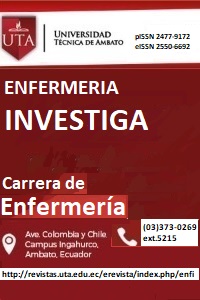PERSONAL VALUES IN THE CONSTRUCTION OF HEALTHY LIFESTYLES IN THE POST-INFARTTED PATIENT
Main Article Content
Abstract
Introduction: Myocardial infarction is one of the main causes of death and disability in the world. It is important to discover the meaning of personal values in the construction of lifestyles for people who have suffered a myocardial infarction in order to delve into facets of daily life and the feelings generated by the disease, from their own perspective. Objective: Generate a theoretical approach based on the meaning that personal values have for people who have suffered a myocardial infarction in the construction of healthy lifestyles. Methods: Qualitative study, under the hermeneutic phenomenological approach, using the Spiegelberg method. The key informants were five people who have suffered a myocardial infarction who are in phase III of cardiac rehabilitation and who are at home. The in-depth interview was the data collection technique. Results: Personal values were developed such as camaraderie, humility, solidarity, family love, value for life and faith. This was possible through understanding healthy lifestyles before and after having suffered a myocardial infarction, with priority to modify unhealthy lifestyles to healthy ones based on adequate nutrition, physical activity and reduction of stress for which the person requires making decisions, based on in autonomy and self-responsibility. Conclusions: People highlight the meaning of lifestyles, in their lived experience, where they recognize the importance of their existence and adopt healthy self-care behaviors such as good nutrition, rest, exercising and not consuming tobacco or alcohol.
Downloads
Article Details

This work is licensed under a Creative Commons Attribution-NonCommercial 4.0 International License.
References
Calpa, Ángela. Promoción de estilos de vida saludables: estrategias y escenarios. Revista Hacia la Promoción de la Salud. 2019. Volumen 24, No.2. DOI: 10.17151/hpsal.2019.24.2.11
Organización Mundial de la Salud. Estrategia mundial sobre régimen alimentario, actividad física y salud 2018. Ginebra, Suiza: OMS; 2018. Disponible en: https://www.who.int/dietphysicalactivity/ strategy/eb11344/strategy_spanish_web.pdf
Organización Panamericana de la Salud (OPS). Proyectos de prevención y control de enfermedades no transmisibles e información y análisis de salud y área de desarrollo sostenible y ambiente: enfermedades no transmisibles en las Américas: indicadores básicos 2011.Washington DC, Estados Unidos de América. Disponible en: http://ais.paho.org/chi/brochures/2011/BI_2011_ESP.pdf. 2011.
Luquis R, Paz H. Attitudes About and Practices of Health Promotion and Prevention Among Primary Care Providers. Health. Promot. Pract. 2014; 16(5): 745-755. Disponible en: https://pubmed.ncbi.nlm.nih.gov/25445979/
Quillas B, Vásquez V, Cuba F. Promoción de cambios de comportamiento hacia estilos de vida saludable en la consulta ambulatoria. 2017. Perú.; 34 (2): 125-31. Disponible en: http://www.scielo.org.pe/scielo.php?pid=S1728-59172017000200008&script=sci_abstract
Martínez J, Linares R. Modelos de prevención de riesgo cardiovascular y papel de la enfermería en la prevención. Enfermería cardiológica. 2014; XXI(63): 44-48. Disponible en: http://hdl.handle.net/10481/47972
Núñez T. La nueva era de la cardiología social en Venezuela. Presentación del plan de acción de la sociedad venezolana de cardiología para el control de las enfermedades cardiovasculares. 2016. Disponible en: http://svcardiologia.org/es/index.php/info/eventosnacional470-la-nueva-era-de-la-cardiologia-social-en venezuela.html
Aristizábal Gladis. El modelo de promoción de la salud de Nola Pender: Una reflexión en torno a su comprensión. Enferm. univ. 2011; 8(4): 16-23. Disponible en: http://www.scielo.org.mx/scielo.php?script=sci_arttext&pid=S1665-70632011000400003&lng=es.
Saborío A. teorías del aprendizaje según Brunner. Psicología On line. 2019. Disponible en: https://www.psicologia-online.com/teorias-del-aprendizaje-segun-bruner-2605.html
Leal, J. La Autonomía del Sujeto Investigador y la Metodología de Investigación. Venezuela. Editorial Signos, C.A. 4ta. Edición. 2017.
Morales, José. Fenomenología y Hermenéutica como epistemología de la investigación. Revista Paradigma. 2011; 32(2): 007-022. Disponible en: http://ve.scielo.org/scielo.php?script=sci_arttext&pid=S1011-22512011000200002&lng=es&tlng=es.
Spiegelberg H. The phenomenological Movement. A historical introduction. Volume one. Springer. SPRINGER-SCIENCE+BUSINESS MEDIA, B.V. 1960; p. 318, 326.
Escalante E. Páramo M. Aproximación al análisis de datos cualitativos. Aplicación en la práctica investigativa. Argentina: Universidad de Acocagua; 2011 Disponible en: http://bibliotecadigital.uda.edu.ar/objetos_digitales/177/aproximacion-al-analisis-de-datos-cualitativos-t1-y-2.pdf.
Bermejo,J. Hacia una salud holística Chile; 2018 Disponible en: http://www.humanizar.es/fileadmin/documentos/JC_Bermejo_Hacia_una_salud_holistica.pdf.
Gallego, Javier. Metodología y contenido axiológico de los programas de educación en valores. Foro de Educación 2016;21: 217-226.
Blasco M. Ortiz S. Ética y valores en enfermería. Rev. Enfermería. México Seguro Soc.2016. 24(2):145-149. Disponible en: https://www.medigraphic.com/pdfs/enfermeriaimss/eim-2016/eim162l.pdf.
Valencia, Satir V. Relaciones humanas en el núcleo familiar. México DF: editorial. Pax; 1992.
Mesa L. Trayectorias de vida e infarto agudo de miocardio: vivencias de varones de la ciudad de Bogotá. Rev Univ Ind Santander Salud. 2016; 48(3): 375-383. DOI: http://dx.doi.org/10.18273/revsal.v48n3-2016011
Fundación Española del Corazón. Factores de riesgo. Disponible en: https://fundaciondelcorazon.com/prevencion/riesgo-cardiovascular.html
Nettina S. Enfermería práctica. México. Editorial Mc Graw Hill Interamericana. 8ta.Edición. 2007. Vol.1.
Saldarriaga C. Conocimiento del riesgo de presentar un infarto de miocardio y las barreras para el acceso al estilo de vida saludable. Rev. Colomb. Cardiol. 2016;23(3) DOI: https://doi.org/10.1016/j.rccar.2015.07.005
D´Anello Esqueda L. Aportes a la psicología social de la salud. Mérida, Venezuela. 2006
Ehrenzweig Y. Modelos de cognición social y adherencia terapéutica en pacientes con cáncer. Revista avances en psicología latinoamericana. 2007; 25 (1).
Ramos, M. Para educar en valores. Teoría y práctica. 2001. Caracas, VE: Paulinas.
Fernández Héctor. Terapia cognitivo conductual. Revista de Psicopatología y Psicología Clínica. 2017;22: 157-169. DOI: http://dx.doi.org/10.5944/rppc.vol.22.num.2.2017.18720
Leyton-Román, M., Mesquita, S., & Jiménez-Castuera, R. Validation of the Spanish Healthy Lifestyle Questionnaire. International Journal of Clinical and Health Psychology. 2021; 21(2): 100228. DOI: 10.1016/j.ijchp.2021.100228
Turienzo Rubén. El pequeño libro de la motivación. Editorial Alienza. 2016. Barcelona.
Orbegoso, A. La motivación intrínseca según Ryan y Decy. Educare, Revista Científica de Educación. 2016; 2(1): 75-93. DOI: http://dx.doi.org/ 10.19141/2447-5432/lumen.v2.n1.p.75-93
Castro, S. Disonancia Cognitiva Blog. 2022. Disponible en: https://www.iepp.es/disonancia-cognitiva/
Insuasti, H. R., Zambrano, D. M., & Giler, M. V. El Modelo de Creencia de Salud (HBM): un análisis bibliométrico. FACSALUD-UNEMI. 2020; 4(7): 43-54. DOI: https://doi.org/10.29076/issn.2602-8360vol4iss7.2020pp43-54p


